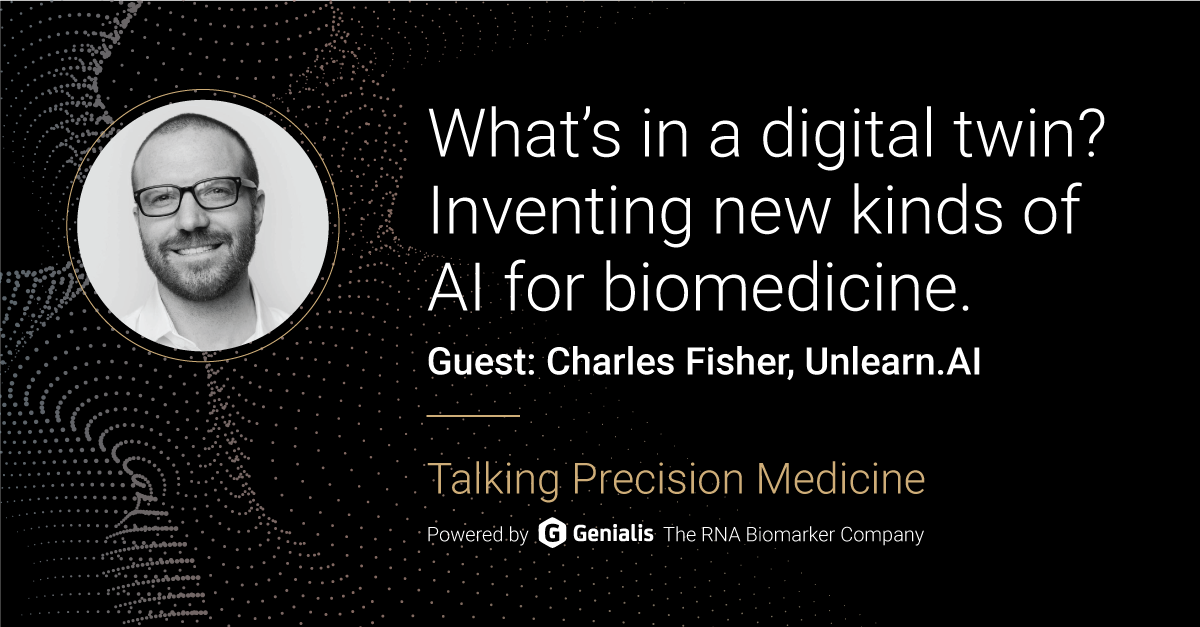Welcome to Talking Precision Medicine (TPM podcast) — the podcast in which we discuss the future of healthcare and health technology, and how advances in data and data science are fueling the next industrial revolution.
Our guest this episode is Charles Fisher, co-founder and currently Chief Scientific Officer of Unlearn.AI. Unlearn has been a leader in the advancement of Digital Twins as a tool to drastically improve the efficiency of clinical trials. Not only a visionary scientist and trailblazing entrepreneur, Charles is fearless with his hot takes. So sit back and enjoy this free wheeling conversation!
Come on in and have a listen.
Episode highlights:
Unlearn.AI
- Initially conceived to develop generative models for broad scientific applications, Unlearn.AI pivoted to focus on healthcare solutions, identifying a niche in enhancing clinical trial efficiency through AI.
“Everybody is working on images, so how do you generate images, or how do you generate text. These are the only two research problems that anyone seems to be working on in the AI space. Personally, I don’t find it that interesting to think about how I can build an AI system that automates tasks humans can already do. It’s not to say it’s not important; it’s just that other people are working on it. I want to focus on how I can create AI systems that invent new types of things, that extrapolate beyond human knowledge. I want to create things that solve problems humans cannot yet solve.”
Digital twin technology
- Unlearn.AI specializes in creating digital twins for clinical trial participants, leveraging machine learning to simulate individual patient outcomes, thereby potentially reducing reliance on control groups.
- Patients primarily benefit from digital twins, as they minimize exposure to potentially ineffective treatments.
- Pharmaceutical companies can see reduced costs and faster clinical trial processes by reducing the number of participants needed.
“The digital twin of a person is a computer model that allows us to forecast any aspect of that person’s health at any point in the future. That’s what we’d like to be able to build—sort of like a crystal ball that you could use to predict anything about anyone on earth, at least when it comes to health.”
Data integration for AI models
- Massive datasets involving over 1 million patient records from clinical trials are utilized to train Unlearn’s predictive models.
- The process involves sophisticated data harmonization techniques to standardize disparate data sources.
“Often within the healthcare space, you see an anticorrelation between the size of the data set and the quality of that data set. So, you have this kind of option of either getting a really small, high-quality data set or getting a really big, shitty data set, and it’s like, which of these two things do you want to choose? And I’ve always taken the view that you need to do machine learning from really high-quality data. You don’t want a really big, shitty data set; it has to be high quality. You can’t fix quality with big.”
Leadership vs. scientific pursuits
- Discussing his transition from CEO to a more research-focused role, Charles Fisher, a theoretical physicist, shares insights into aligning leadership roles with personal passion.
“I certainly caved to some of the pressure that I was put under by various people around me to stop doing science. And if I could go back and do it all again, I would tell those people to go pound sand. I’m going to continue to do science. Oh, what are you going to do to me? Yeah, I would 1000% do that.”
The vision of AGI
- Charles Fisher envisions a future where Artificial General Intelligence (AGI) transforms healthcare, predicting that it could be a reality in the next 10 to 20 years. He suggests that while current AI advancements are significant, they still require breakthroughs to achieve true intelligence.
- He also predicts a period of significant resistance from healthcare professionals which could delay the integration and benefits of AGI in medicine.
“That face-to-face interpersonal kind of empathetic interaction belongs to the people and the information processing belongs to AI, which honestly is probably better for everybody. As quickly as we can get to that future, I think the better.”
This has been Talking Precision Medicine. Please subscribe and share our podcast with your colleagues, leave a comment or review, and stay tuned for the next episode. Until then you can explore our TPM podcast archive and listen to interesting guests from our past conversations.




